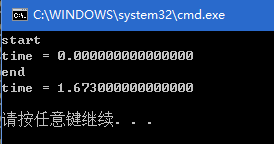read
在做多校时就看过这些代码,一直没有放在心上,现在心血来潮,测试了一下它的实用性。
我们知道,cin最慢,scanf较快,然而字符串读入的getchar是最快的。那么到底有多块呢?‘
测试
博主自己模拟了1+1000*10000的数据来整型读入。光是数据文件就有

然后用scanf和read来比较一下。cin我已经放弃了…………
结果
scanf

read

总结
快速读read快scanf 4倍,时间为scanf的1/4,在ACM的大数据题目中可以节约不少时间……
c++代码
1 2 3 4 5 6 7 8 9 10 11 12 13 14 15 16 17 18 19 20 21 22 23 24 25 26 27 28 29 30 31 32 33 34
| #include <iostream> #include <cstdio> #include <cstring> #include <algorithm> #include <time.h> using namespace std; #define showtime printf("time = %.15f\n",clock() / (double)CLOCKS_PER_SEC) int dp[100800]; inline int read(){ char c; int ret = 0; int sgn = 1; do{c = getchar();}while((c < '0' || c > '9') && c != '-'); if(c == '-') sgn = -1; else ret = c - '0'; while((c = getchar()) >= '0' && c <= '9') ret = ret * 10 + (c - '0'); return sgn * ret; } int main(){ freopen("test.in","r",stdin); puts("start");showtime; int t;t=read(); for(;t--;){ for(int i=1; i<=10000 ; i++){ dp[i]=read(); } } puts("end");showtime; for(int j=1; j<=1000; j++) for(int i=1; i<=10000 ;i++) printf("%d%c",i,i==10000?'\n':' ');*/ return 0; }
|



